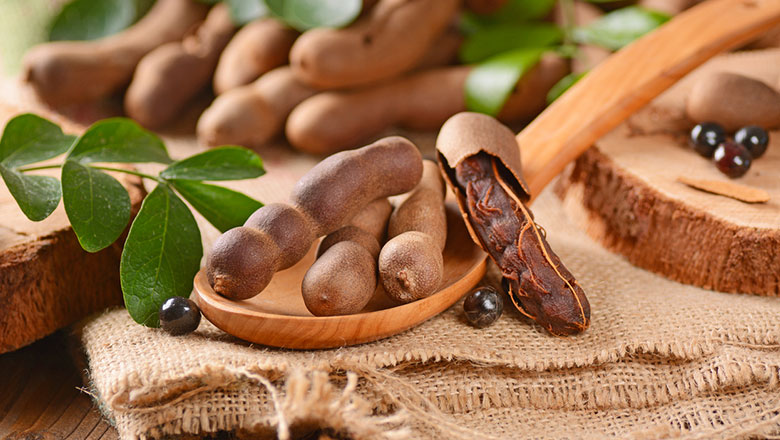An all-rounder of thickeners and complete package of features
Tamarindus Indica is a leguminous plant hailing from the Fabaceae family. The plant is popularly grown in abundance in the Indian sub-continent and source of various benefits in Food, Feed and Polysaccharide world. India is the major producer and exporter of tamarind seed gum and tamarind pulp to all over the world.
Tamarindus Indica is a perennial shrub that grows up to 18 meters of height, with its crown forming an irregular shape, to that of a vase. The plant is very dense with foliage, which gives a rustic appeal. It grows faster in full sun. The flowers and buds are small, making them unconstructive to the environment. The flowers are red and yellow and elongated in shape. The fruit of the plant is juicy and full of flesh. The change in the red shade can is a sign of maturity of the plant. The fruit is a mixture of sweet and sour but is rich in multiple nutrients as vitamins, calcium, tartaric acid and natural sugars.
Constitution of the Seed
The seed is high in proteins, oils and fats (more than 25%) besides fibre and polysaccharides (more than 55%).
Organic Thickener and Carrier
It is a very a film former beside being high-performance thickener and gelling agent. It can be exploited in a wide range of applications in food, pharmaceuticals and other industrial applications.
1. Tamarind seed polysaccharides are the key additive playing roles of thickeners, stabilizers, and binders to cover a wide range of combinations in industries like oil and petroleum, food, ink, paper, cosmetic, paint. The use in pharmaceuticals They are also used in pharmaceutical industries as binders and disintegrating agents in tablets, materials that require coating in microencapsulation, controlled release and dilution of tablets suspensions and emulsions of syrups, etc are few such application which is not just cost-effective, but also dependable in availability and usability. Plant polysaccharides are used in many applications because they are cost-effective, easily attainable and have are inbuilt with properties that are instrumental while manufacturing products.
2. The demand for Tamarind seed polysaccharide is due to its highly reliable and dependable tolerance against broad pH, acidic, alkaline and electrolyte achieving stability. The biocompatibility and good resistance against enzymatic degradation make it an additive of choice in various probiotics. had increased drastically. They demonstrate excellent traits of natural excipient. Since it is a galactoxyloglucan that is derived from the kernels of Tamarindus indica it possesses properties such as broad pH tolerance, adhesivity and high viscosity. They are also biocompatible, having a high drug holding capacity and high thermal stability. Tamarind seed polysaccharide is commonly used as binders during tablet formulations.
Uses and Functionality
Acts as a Thickener and Stabiliser
Tamarind seed polysaccharide gives out a rich feeling due to its consistency. Due to its high velocity, it enhances product stability. The additive can act against acid, heat and salts. It is known to be a highly soluble fibre which acts with the components that form a good mouthfeel without any presence of starch.Prevents and Icey Crystal from Growing
Tamarind seed polysaccharide can prevent the growth of ice crystals on frozen foods due to its water-retaining capacity. Ice creams stay cold for a while due to this additive. Being a good resister against acid, Tamarind seed polysaccharide is the perfect hydrocolloid for sherbets where acid is very strong. It is also good for the tissues.Prevents Separation of Water and Providing Sheen
Tamarind seed polysaccharide has the potential to hold water in food produces, hence increasing the shelf life of the goods. Through this agility, the foods retrain from drying and enhance the appeal.Gelling Agent
Tamarind seed polysaccharide emanates from seed kernels of the tamarind that constitutes 48% of the gel-forming polysaccharide, also known as the jellose. It can form a gel in a broad range of PH, along with the attendance of sugars and alcohol in various temperatures. This is considered as one of the primary industrial uses of tamarind kernel. Because the seed can be attained in plenty, it is economically efficient than other agents that are used for industrial purposes.
Nutritional Supplement
Tamarind seed polysaccharide is used as a food additive due to its gelling capability. Henceforth, it is used as a thickener and stabilizer in Ice creams, cakes and dairy products. It is preferred as an essential tool in aqueous solution to control flow rate.
Imitation of properties to bring enhancements in food
People who are allergic to gluten have to stay away from products that contain gluten, which mainly comprises of wheat-based products. Wheat is necessary for the body as it provides iron, folate and thiamine. To tackle this, Tamarind gum is used as a substitute to improve the viscosity instead of using gluten and gives a good feel in the mouth. Since it is made from natural fibre, it is also considered healthier as it boosts immunity.
All in all. Tamarind seed polysaccharide has all the properties necessary for industrial uses as well as improves health. Sarda Bio Polymers infuses the latest technology and healthy lifestyle under one bridge, making sure that our clients grow with positive results. Our in-depth research to fabricate high-quality gums has earned us the title of ‘Gum Specialists’ and we look forward to holding on to that.
